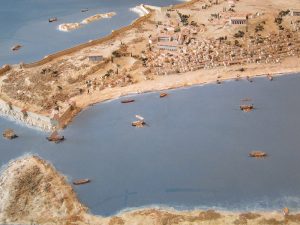 Marseille is the fifth largest port in Europe, after Rotterdam, Antwerp, Hamburg and Amsterdam. The port has a very old history. People lived in the Cosquer cave near Marseille around 27,000 years before the era. They left behind images of human hands and animals. Around 600 BCE, Greeks from Phocaea, a Greek city now located on the west coast of Turkey, founded a colony called Massalia. The sea inlet here, with its surrounding hills and mountains, which protected ships, resembled Phocea harbor. The sailors focused on the eastern Mediterranean.
Marseille is the fifth largest port in Europe, after Rotterdam, Antwerp, Hamburg and Amsterdam. The port has a very old history. People lived in the Cosquer cave near Marseille around 27,000 years before the era. They left behind images of human hands and animals. Around 600 BCE, Greeks from Phocaea, a Greek city now located on the west coast of Turkey, founded a colony called Massalia. The sea inlet here, with its surrounding hills and mountains, which protected ships, resembled Phocea harbor. The sailors focused on the eastern Mediterranean.
But an adventurous explorer and scientist, Pythias, sailed west and north in search of the places where tin and amber came from. That came from southern England and the Baltic countries. Pythias left Marseille around 330 BC. He reached Britain, explored the coast on foot, and also sailed to northern Germany, where the Scythians, a mythical people in the eyes of the Greeks, lived at the time. He wrote a book about his experiences: About the Ocean, which unfortunately has been lost.
The Greeks mixed with the Celtic Gauls, forming a Provencal culture that acted as a bridge between the Mediterranean world and the northern Celtic world. The residents imported and exported olive oil, wine and pottery. From 49 BC, Marseille became part of the Roman Empire for five centuries.
In 1486, Provence, and therefore Marseille, was added to France. Marseille became a free trade port and traded with the entire Mediterranean region. Ships regularly carried epidemics from caravans from the Far East, which gave their belongings to ships in the Middle East. In 1720, a ship with silk and cotton arrived from Syria, contaminated by the plague. The cargo had to be sent urgently to Beaucaire’s annual market. The plague that broke out killed 30,000 of the 90,000 inhabitants of Marseille. In the eighteenth century, ships from Marseille sailed the world’s seas, Marseille was a center of world trade.
During the French Revolution (1789-1794), a group of people moved from Marseille to Paris to help their revolutionary brothers. Their battle song: “Allons enfants de la patrie, le jour de gloire est arrivé!” became the national anthem of France, the Marseillaise.
France had many colonies from the seventeenth century onwards; after the First World War (1914-1918) the country owned one tenth of all the land on earth. Marseille played an important role in the colonial empire.
Shortly before and during World War II, Marseille was a port from which refugees tried to escape to the Americas. After the war most colonies became independent countries, often after bloody wars of independence. The city is a mix of all possible populations, with a rich culture, a love for freedom and with a lot of crime – especially drug trafficking.
Marseille has numerous ports along the coast west of the city. The westernmost and largest port area, Fos-sur-Mer, is located sixty kilometers away. There is a huge industrial area, with mainly petrochemical and steel industry.




